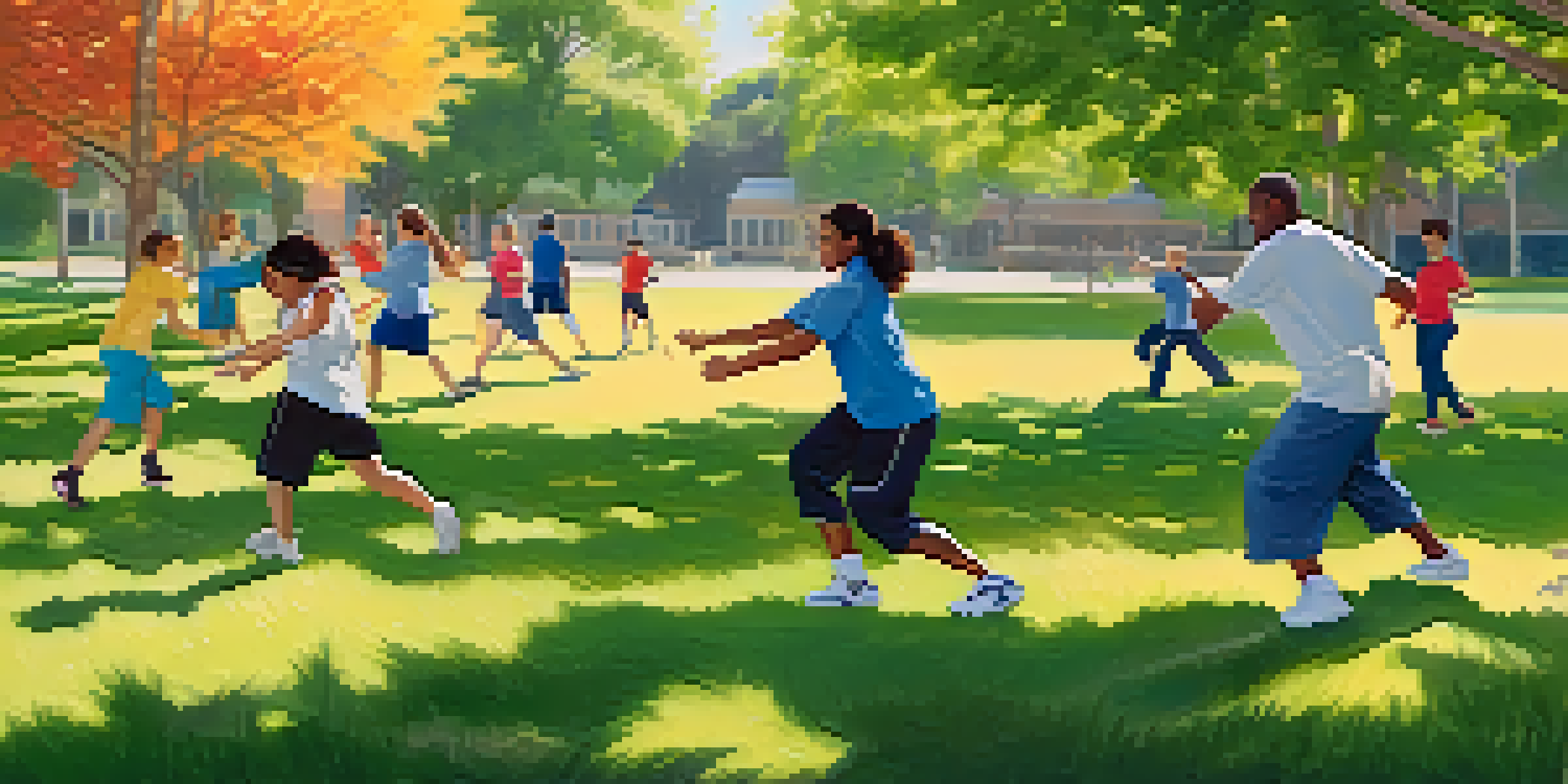Understanding Autism: A Guide to Self Defense Techniques

Understanding Autism: Key Characteristics and Challenges
Autism Spectrum Disorder (ASD) encompasses a range of developmental conditions that affect communication, behavior, and social interaction. Individuals with autism may experience sensory sensitivities, making environments overwhelming and potentially dangerous. Recognizing these characteristics is essential to developing effective self-defense strategies tailored to their unique needs.
Self-defense is not just a set of skills, it's an attitude of self-confidence and resilience.
Many individuals with autism may struggle with anxiety in social situations or when faced with unexpected changes. These feelings can heighten vulnerability, making it vital to equip them with skills to navigate potentially threatening encounters. Understanding these emotional aspects helps in creating a supportive environment for learning self-defense techniques.
Moreover, it's important to note that each individual with autism is unique, and their experiences may vary widely. This diversity means that self-defense strategies should be personalized and adaptable, ensuring they resonate with the individual’s specific strengths and challenges.
Importance of Self-Defense for Individuals with Autism
Self-defense skills are not just about physical protection; they empower individuals with autism to feel more confident and secure in their daily lives. Learning these skills can significantly enhance their sense of autonomy, enabling them to navigate the world with greater assurance. This newfound confidence can also improve their overall quality of life.

Additionally, self-defense training can serve as a valuable tool for social interaction. It provides opportunities for individuals to engage with peers and instructors in a positive, structured environment, fostering social skills and cooperative learning. This interaction can help break down barriers and build community.
Understanding Autism's Unique Needs
Recognizing the diverse characteristics of individuals with autism is crucial in developing tailored self-defense strategies that cater to their specific strengths and challenges.
Ultimately, self-defense techniques can help individuals with autism respond effectively to various situations, reducing fear and anxiety. By equipping them with practical skills, we are not just preparing them for potential threats but also instilling a sense of agency and control over their circumstances.
Choosing the Right Self-Defense Program
When selecting a self-defense program for individuals with autism, it’s essential to look for instructors experienced in working with diverse learning needs. Programs that emphasize clear communication and patience can foster a more inclusive learning environment. This ensures that participants feel comfortable and engaged throughout the training.
The best way to predict your future is to create it.
It’s also beneficial to choose a program that incorporates sensory-friendly techniques. Many individuals with autism may require a modified approach to learning physical skills, especially if they are sensitive to touch or loud noises. A good program will adapt its methods to accommodate these sensitivities, ensuring a positive experience.
Finally, consider the class size and structure. Smaller classes allow for more personalized attention, which is crucial for effective learning. By finding a program that aligns with the individual’s needs, you can help them build skills in a supportive and encouraging setting.
Fundamental Self-Defense Techniques to Learn
Some foundational self-defense techniques that can be beneficial include basic escape maneuvers, awareness of surroundings, and assertive body language. These skills help individuals recognize potentially dangerous situations and respond appropriately. Practicing these techniques in a safe environment allows for gradual learning and confidence-building.
Verbal de-escalation techniques are also vital. Teaching individuals to use their voice to express discomfort or set boundaries can be incredibly empowering. This approach not only promotes self-advocacy but also helps them manage encounters before they escalate into physical confrontations.
Empowerment Through Self-Defense
Learning self-defense skills enhances confidence and autonomy for individuals with autism, allowing them to navigate their environments with greater assurance and reduced anxiety.
Lastly, practicing situational awareness is crucial. Training individuals to be aware of their surroundings can significantly reduce vulnerability. This skill encourages them to identify safe spaces and potential risks, fostering a proactive mindset that can enhance their safety.
Building Confidence Through Practice and Repetition
Repetition is key when learning self-defense techniques, especially for individuals with autism. Regular practice helps reinforce skills, making them second nature. This consistent exposure can reduce anxiety and build confidence, allowing individuals to feel more secure in their abilities.
Incorporating role-playing scenarios can also enhance learning. By simulating real-life situations in a controlled environment, individuals can practice their responses. This experiential learning method allows them to process their reactions and refine their techniques in a supportive setting.
Finally, celebrating small victories during practice can boost morale and encourage perseverance. Acknowledging progress, no matter how minor, helps maintain motivation and reinforces the idea that they are capable of defending themselves.
Incorporating Self-Defense into Everyday Life
Integrating self-defense principles into daily routines can further enhance learning and retention. Encouraging individuals to practice situational awareness during everyday activities, like walking in a neighborhood or shopping, helps solidify these skills. This real-world application reinforces the importance of self-defense beyond the training environment.
Another practical approach is to involve family members or caregivers in the learning process. By practicing techniques together, they can create a supportive network that fosters confidence and accountability. This collaborative effort also helps ensure that individuals feel secure when applying their skills in real-life situations.
Choosing Inclusive Programs Matters
Selecting self-defense programs that prioritize clear communication and sensory-friendly techniques ensures a supportive learning environment for individuals with autism.
Ultimately, the goal is to cultivate a mindset of safety and self-empowerment. When self-defense becomes a part of daily life, individuals with autism can navigate their environments with greater assurance, knowing they have the skills to protect themselves if necessary.
Resources and Support for Further Learning
There are numerous resources available for individuals with autism who want to learn self-defense. Many organizations offer tailored programs specifically designed for neurodiverse individuals. These programs often provide a safe, understanding atmosphere that promotes learning and growth.
Online platforms can also be valuable, offering video tutorials and community forums where individuals can connect with others sharing similar experiences. These resources enable learning at one’s own pace, ensuring comfort and accessibility for everyone involved.

Lastly, don’t underestimate the power of local community groups. Many neighborhoods host classes or workshops that foster safe spaces for individuals to learn self-defense techniques. Engaging in these community activities not only builds skills but also strengthens social connections.